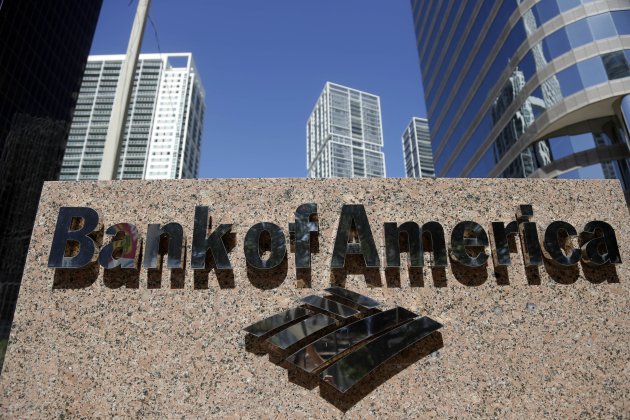
The federal government filed a civil lawsuit against Bank of America Corp. (BAC), alleging the second-biggest U.S. bank by assets saddled taxpayers with losses by misrepresenting the quality of home loans it sold to mortgage-finance firms Fannie Mae (FNMA) and Freddie Mac (FMCC) .
The action, filed Wednesday in federal court in Manhattan, seeks at least $1 billion in damages. The filing represents a novel effort by the government to defray costs tied to the 2008 bailout of Fannie and Freddie, and potentially opens a new front against a banking industry already dealing with hefty legal costs.
The government alleges Countrywide, which Bank of America acquired in 2008, dismembered quality control and checks on loan quality in 2007 through 2009, in a process called "the Hustle" that aimed to boost the speed at which it originated and sold loans to the companies. The mortgage unit falsely continued to claim the loans qualified for insurance from Fannie Mae and Freddie Mac, the complaint alleges.
A Bank of America spokesman didn't provide immediate comment. Bank of America shares, up 70% this year, were up six cents in midday trading Wednesday at $9.41.
The government is suing Bank of America under the Federal False Claims Act, which has become a popular tool for prosecutors seeking to hold banks accountable for alleged mortgage misdeeds and calls for triple damages when the government can show taxpayers were ripped off.
This is the second suit Preet Bharara, the U.S. attorney for the Southern District of New York, has brought against banks it accused of duping the federal insurance programs this month. Two weeks ago, his office sued Wells Fargo & Co. (WFC), the biggest U.S. mortgage company, of recklessly issuing mortgages and leaving the Federal Housing Administration to pick up the tab.
Fannie and Freddie, while backed by taxpayers since the 2008 bailout, aren't part of the government. Previous suits have been brought on behalf of government agencies such as Medicare and the FHA.
Fannie and Freddie were publicly traded entities before their market funding evaporated in the early stages of the financial crisis, forcing their effective nationalization. Taxpayers have since poured $142 billion into the companies, which along with other government agencies financed nine out of 10 home loans written last year. Fannie and Freddie don't make loans but guarantee regular principal and interest payments to mortgage-bond investors.
[More from WSJ.com: J.P. Morgan Gets Stung by China Downturn]
Wednesday's suit was also brought under a federal statute known as the Financial Institutions Reform, Recovery and Enforcement Act, which was enacted in 1989 following a wave of bank failures triggered by the savings-and-loan crisis.
Last year Fannie's and Freddie's regulator, the Federal Housing Finance Agency, sued 18 major banks including Bank of America, accusing them of violating federal securities law and other laws in the sale of residential private-label mortgage-backed securities. The seven biggest U.S. commercial banks have recognized or set aside $76 billion in mortgage-related legal costs since 2008, according to analysts at Credit Suisse Group (CSGN.VX).
Fannie Mae stopped buying or guaranteeing new loans delivered by Bank of America this past February amid an impasse over billions in defaulted mortgages that Fannie said Bank of America was obligated to repurchase. Negotiations over resolving the dispute are ongoing, according to both parties.
Bank of America briefly became Fannie's top client following its acquisition of Countrywide. It accounted for 20% of all loans Fannie bought or backed in 2009, but that share had fallen below 10% by the third quarter of 2011, and below 3% in the fourth quarter, according to Inside Mortgage Finance.
[More from WSJ.com: How to Revamp Fannie, Freddie]
The action isn't Bank of America's first False Claims Act suit. In February, Bank of America agreed to a $1 billion settlement of False Claims Act fraud allegations tied to Federal Housing Administration-backed loans brought by the Eastern District of New York. The bank settled without admitting wrongdoing. Three other large banks have agreed to pay a total of more than $490 million in similar cases, each accepting responsibility for "certain conduct."
The suit follows in a long line of legal headaches for Bank of America. Last month, the bank agreed to pay $2.43 billion to settle claims it misled investors about the acquisition of brokerage firm Merrill Lynch & Co., the largest settlement of a shareholder claim by a financial-services firm since the upheaval of 2008 and 2009.
The lawsuits continue to underscore how the hasty acquisitions made during the height of the financial crisis by Kenneth Lewis, then the bank's chief executive, still haunt it today. Decisions to buy mortgage lender Countrywide and Merrill have forced Bank of America, run since 2010 by Chief Executive Brian Moynihan, to shoulder some $42 billion in litigation expenses, payouts and reserves, according to company figures.


